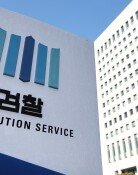Ports Reeling From 3rd Day of Truckers` Strike
Ports Reeling From 3rd Day of Truckers` Strike
Posted December. 20, 2008 02:01,
The nationwide truckers strike entered its third day yesterday, as cargo transportation at ports and inland container terminals saw their operational rates plunge to 20 percent.
With 15,000 truckers across the country on strike, disruption in cargo transportation is getting increasingly serious. Certain ports such as Busan North Port are struggling to handle import and export cargo.
▽ Saturated ports
The Land, Transport and Maritime Affairs Ministry said Busan North Port filled 85 percent of its container yard yesterday, far higher than the usual 72 percent.
The ports of Gamman and Shingamman were effectively shut down as their cargo occupancies exceeded 100 percent. Tractor trailers with containers stopped operating, but cargo ships kept coming in.
Even ships are expected to have difficulty using the port early in the week, when most cargo comes in. Port authorities also warned that ports will stop functioning altogether in two or three days.
With the truckers union on strike and more non-unionized truckers joined, the port of Gwangyang saw its cargo transportation rate fall to less than 10 percent.
The Gwangju plant of Kia Motors transported 980 cars to container yards in the Pungam-dong and Pyeong-dong districts from Saturday with the help of more than 300 employees.
The inland container terminal in Euiwang, Gyeonggi Province, also saw cargo transportation halved. Most cargo was transported via rail.
▽ Snowballing losses
Twenty-one crimes including sabotage of other cargo trucks operations have occurred since the strike began.
Busan police applied for an arrest warrant against a member of the truckers union who blocked a container vehicle and destroyed it by throwing a flaming liquor bottle at it.
Police in South Jeolla Province also booked two other unionists without detention on the charge of impeding transportation.
Export losses from the strike were estimated at 11.75 million dollars or about 12.2 billion won).
The Korea International Trade Association said 54 companies failed to export 11.75 million dollars worth of products and 30 importers lost 3.02 million dollars.
An association source said, Losses are increasing with time. If the strike continues for more than 10 days, this could lead to critical damage like cancellation of supply contracts.
▽ No progress in negotiations
The strike is unlikely to go away soon as relations among the government, the truckers union and shipping companies are complicated.
First, legal status and representation of the union is a stumbling block. From a legal perspective, the union is more an association of the self-employed than a union. Because it lacks the right to conduct collective bargaining, the union cannot directly negotiate with shippers.
Shipping companies lack a nationwide organization and their management varies according to business size, cargo type and financial conditions. Transportation fees depend on the volume of cargo to be transported, which makes systematic negotiations difficult.
The government and the ruling Grand National Party held an emergency consultation yesterday to end the strike, discussing measures to restructure the cargo transportation market.
The government and the party are planning to complement existing laws to improve the multi-layered logistics and transportation system. Cargo is consigned over three to four steps, and truckers must pay a 10-percent commission under each step. As a result, they earn only 60 to 70 percent of transportation fees.
President Lee Myung-bak said Saturday, As the economy is not in good shape, the three parties should make concessions to resolve the issue as early as possible. They need to help shipping companies actively participate in the negotiations.
Knowledge Economy Minister Lee Youn-ho said, The government will expedite revision of laws to improve the logistics system. Shippers for their part should actively participate in negotiations over transportation fees.
Minister Lee also visited a petrochemical complex in Daesan, South Chungcheong Province, urging CEOs of corporations suffering damage from the strike to set transportation fares at reasonable levels.



![“한동훈, 정치생명 걸고 무소속 출마해 평가받는 것 고려할만”[정치를 부탁해]](https://dimg.donga.com/c/138/175/90/1/wps/NEWS/IMAGE/2026/01/19/133186982.1.jpg)


![[한규섭 칼럼]왜 여당 지지율은 떨어지지 않는가](https://dimg.donga.com/c/138/175/90/1/wps/NEWS/IMAGE/2026/01/19/133189257.1.png)
